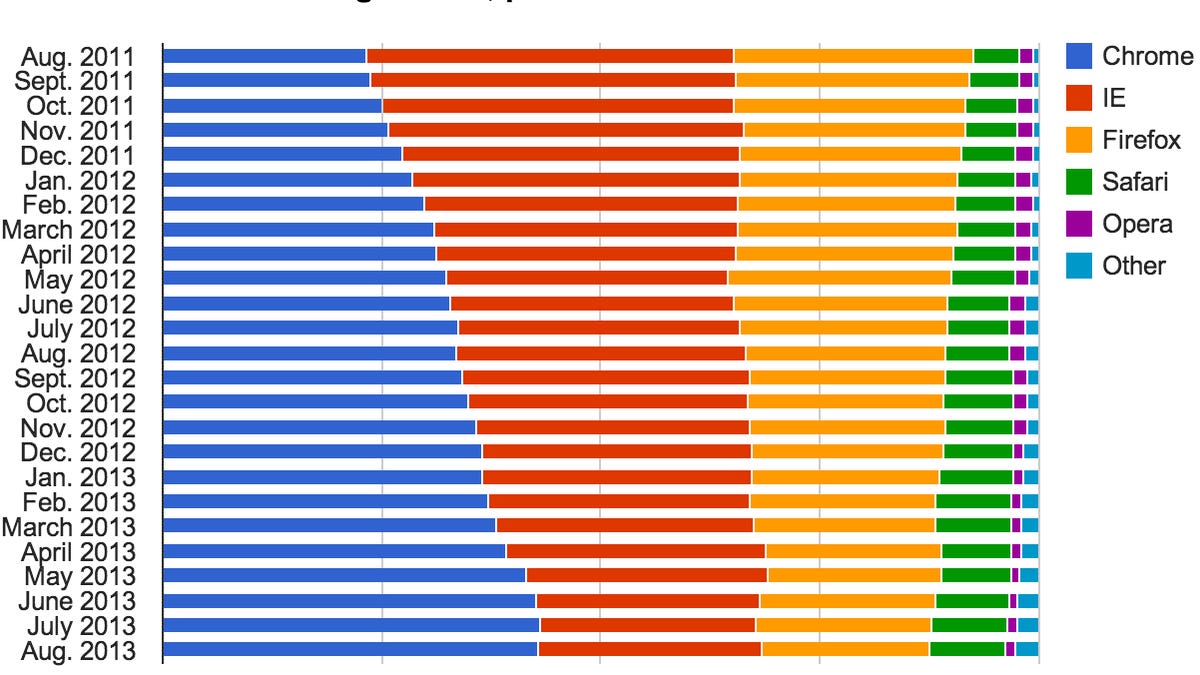Analytics firms agree on August resurgence for Microsoft IE
It may be a turnaround or it may be a blip, but Internet Explorer's share of usage resumed growth according to separate studies of the Web.

StatCounter and Net Applications disagree about the best way to measure browser usage, but for August, they agreed on one thing: Microsoft's Internet Explorer had something of a resurgence.
The two firms use different methodology to measure browser usage -- for example, StatCounter measures all page views to its network of Web sites while Net Applications only counts one per day to try to measure users more than usage. As a result, StatCounter names Google's 5-year-old Chrome as the top browser, but Net Applications gives the honor to IE.
For August, though, IE looked better off in both companies' eyes, according to statistics released Sunday. Net Applications showed IE reversing its fortunes in January 2012, gradually reclaiming some of the market share it lost to rival browsers in the wake of Microsoft's decision to largely cease browser development a decade ago.
StatCounter showed Microsoft's browser continuing its decline, though -- until August, when IE climbed to 25.6 percent of usage from 24.5 percent in July. In its view, Chrome dipped from 43.1 percent to 42.8 percent, and Firefox dropped more, from 20.1 percent to 19.3 percent.
Net Applications shows IE growing from 56.6 percent in July to 56.7 percent in August, with No. 2 Firefox growing 18.3 percent to 18.9 percent. These gains came at Chrome's expense, it said, with Google's browser taking a big monthly drop from 17.8 percent to 16 percent.
The gains have to be welcome news at Microsoft, which lit a fire under its IE team to produce IE9, IE10, and, with Windows 8.1, IE11. Each has become more competitive than its predecessor, improving performance and embracing Web standards rather than running roughshod over them.
It'll take a lot longer to win back the technophiles who were alienated by Microsoft's earlier neglect, though. And it remains to be seen if the IE usage recovery StatCounter detected will persist.
The statistics reflect the ups and downs of a major competition: which company will be the gateway to the Web, where an increasing fraction of people's computing lives takes place. Native applications written for Android and iOS mobile devices are very important, but on personal computers, the browser has assumed major prominence with cloud-computing tools such as Microsoft's Office 365 and Google Docs and with online personal services such as Facebook and YouTube.
Net Applications, which also breaks out its statistics for mobile devices, had bad news for Microsoft: IE dropped off the top-five list as BlackBerry's browser won its place back.
In mobile -- tallied for smartphones and tablets -- the dominant Safari dropped a notch from 58.8 percent in July to 55.5 percent in August. Google's unbranded browser rose from 20.6 to 22.2 percent, Opera Mini dipped from 9.4 to 9.0 percent, Google Chrome rose from 4.4 percent to 5.6 percent, and BlackBerry stayed level at 2.3 percent.
Net Applications also monitors the split between mobile and PC browsing. In August, mobile browsing reached its all-time highest share, 13.4 percent of usage, compared to 85.9 percent for personal computers.

